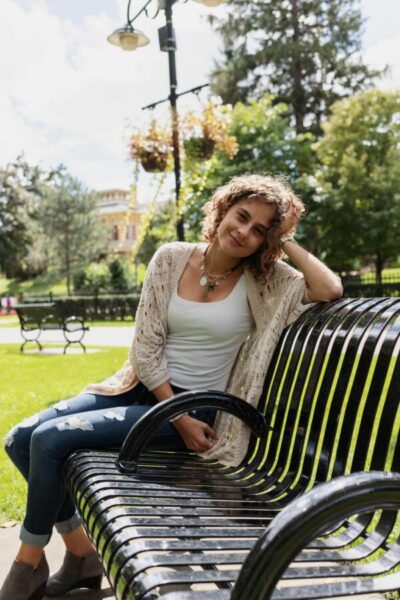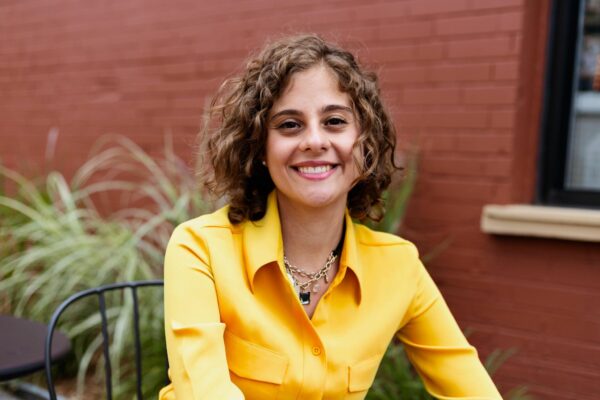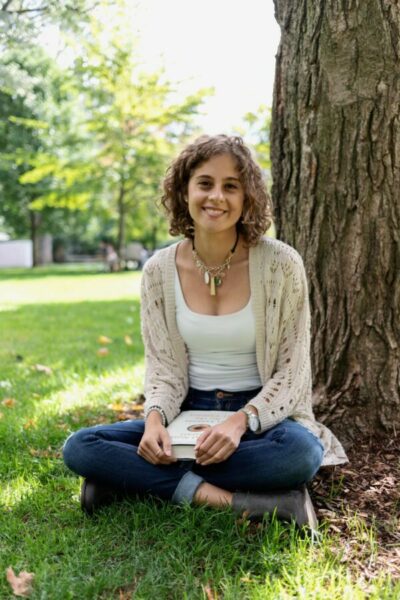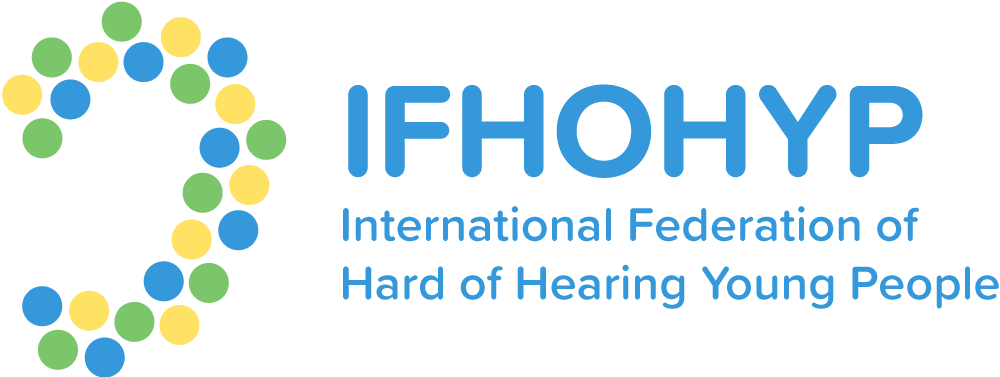Have you ever thought how your words can impact on your environment? Which language would you speak if you weren’t using your mother tongue? How much would we remember without having books? What can you discover, living at the same place for a long time? Karina Cotran, a young brave writer from Canada took on this challenge and was successful in surviving our interrogating ways!
MARIA: Karina, I spent a longer time on your blog, Hearing Differently, and I have so many questions that I even don’t know where to start! From what I’ve read, you’ve been to university, you released a series of short stories entitled ‘Hearing Differently: Growing Up With a Cochlear Implant’ and you seem to be very active in advocating for people with hearing loss.
What is the most significant moment for you on this journey?
KARINA: This is a tough one! I feel like I’ve had a lot – but I think the most significant one was actually at the beginning of my journey – before I even knew the moment was significant, if that makes any sense.
I read an excerpt from my book for the first time at its launch. After the launch, a lady approached me and said that because of me, not only did she feel more confident in her decision to get her child the cochlear implant, but also that she felt more assured that her child will grow up into a very capable person because I had shown that in my mannerisms, and interactions. She was a hearing person, in a hearing family and didn’t have that much exposure to younger children with hearing loss before she had her child.
That moment always stuck with me, and I think was one of the pivotal reasons why I started my blog and did more advocacy work. I had more stories to tell and I just wanted to really show that having hearing loss is not a bad thing, and that it’s society that perceives it as bad – and that we need to work with society to make it easier to live with hearing loss each day.
What made you the person you are now?
I’ll be honest here – I don’t think I can pinpoint to one thing or event in my life that made me into the person that I am today. It was more a bunch of little events – I don’t want to say my hearing loss made me into the person that I am now – only because my hearing loss is NOT who I am – it’s just something that I have.
If I had to choose, the one thing that really helped me become the person I am now is writing my book – I proved to myself that I had a story of my own to tell, and that I was good (hopefully) at telling it. It proved that I had the confidence to share something that I wasn’t initially comfortable in sharing – that and coupled with other life experiences (new friends, living through the pandemic, etc.) has really changed my mindset and view on a lot of things – and made me more empathetic and focused in what I do in my day to day.
Would you consider yourself as a writer?
I do consider myself a writer, yes!
Which kind of stories do you want to tell?
Any story that is worth telling – whether it’s mine, or another person’s. I also write a lot of creative pieces – especially fiction. I personally love to weave elements that are real with elements that are not real. It adds a more magical quality to it, but also allows us to think outside of the box as well.
Something like Gabriel Garcia Marquez and his magic realism?
Yes, something along those lines. Right now, I’m currently fascinated with the concepts of world building – and mixing it up with elements of realism.

Also I really like your attitude, that hearing loss doesn’t define you as a whole individual. How would you define yourself then, besides having hearing loss?
Like I said, having hearing loss does not define me, but it did shape certain aspects of my personality – I think I am more empathetic and find it easier to examine different perspectives of a situation/story because of it. I’m actually hesitant to add a definition to who I am just because that changes year after year – depending on the experiences I’ve had. But if I had to define myself, it would be by my personality and actions – I define myself as someone that is very passionate, and emotional about their surroundings – I’m a writer, I’m a person who is constantly curious (wanting to know the answer to everything), I’m a person who is always searching for something exciting, I’m a person that has immense focus on my passions – such as my blog, advocacy and more.
You also mentioned you weren’t initially comfortable with sharing your experiences. What happened then that you found the courage (because it definitely demands enough courage and self-confidence to do this!) to start writing stories?
I wasn’t comfortable at all – even saying the words, “I have hearing loss” was difficult. It was only when I started writing stories about growing up with hearing loss that I became more comfortable with it. I started writing those stories only for myself – but then being able to put those experiences on paper, and almost separate myself from the character that I had on paper made me realize just how uncomfortable I was with something that has been a part of me since I was very young. Coming to that realization made me realize that my hearing loss and my experiences with it are not something I want to be uncomfortable with. With this discovery, I took that step forward to start sharing them… because I want to help others who were also not comfortable become more comfortable – with something that they can relate to.
What are you working at currently?
Since writing ‘Hearing Differently’ (the book), I’ve been more preoccupied with working on my blog. It’s just until recently that I got back into creative writing. For now, I’ve been working on mini short stories – and trying to get back into the fiction writing style.
There is also one mention about being a person who is always searching for something exciting: what was your last discovery in this area?
I should rephrase myself – I’m always looking for something new to discover – whether it’s a person, place, thing, etc. It’s been hard to really do this during the pandemic but there have been several things.
- I’ve rediscovered my passion for exploring new areas – especially locally since there are travel limitations. I’ve discovered a beautiful river close to my house and now make a habit of going there every once in a while to just appreciate the beauty of what is close to home.
- I’ve really buckled down and honed in on what really excites me – which is writing creatively. I’ve been challenging myself to come up with characters, story ideas, and delving into the different aspects of building a new narrative.
You also described yourself as someone always wanting to know the answer to everything. Can you recall one of the most surprising answers for something nurturing your curiosity?
Oh this is a tough one – haha. I had to think on it for a bit. Honestly, I’m from Ontario (in Canada) – and just recently, I realized just how BIG Ontario is. It takes approximately 24 hours to drive across Ontario. Ontario is comprised of 52 cities and 444 municipalities. I was curious when looking them up… I can safely say I knew less than half of these cities existed. I also noticed a lot of these municipalities (small little areas throughout Ontario) are named after European cities like: London, Paris, Vienna and Copenhagen for example.
I was just stunned by how much there is to discover about a place where I live.
Yeah, when we live in one place for most of our life, we often miss a lot of things, being used to them. But, once when we start to explore, results can be surprising. Do you think Canada (or Ontario) is longing for something from European culture? An example I can share, in Poland a lot of people are infatuated with the ‘American Dream’ and are inspired by Western culture. Have you been to Europe?
This is a good question! I’ve only been to Europe once (Greece with my family a while back) so I can’t be 100 percent sure in my answer. However, I know of a lot of friends and people that have saved up money specifically to travel to Europe – and they have come back with nothing but positive things to say. Based on that, I do think people in Canada do long for the more relaxed European culture as well as the simpler pleasures of surroundings – people always say that Europe is beautiful, as well as the abundance of good food. One comparison I hear a lot is that no matter where you go in Europe, the food is always good, while in Toronto, the food can be a hit or a miss depending on where you go.
Speaking of food- which kind is typical for Toronto?
Well… Toronto doesn’t have a specific type of food at all. We’re actually known for our multicultural food – so we have influences from different areas of the world – that’s why we have little pockets in Toronto called: “Little Italy,” “Chinatown,” “Little Portugal,” etc.
Do you have visible differences in spoken/written language throughout different Canadian provinces? If so, which province is the most HoH-friendly linguistic environment, easier to understand?
I don’t see that in different provinces at all – besides the obvious language difference of French and English – I’m not sure if it’s because I’m not overly familiar with the other provinces… but I actually don’t think we have that many stark differences!
Where do you see yourself in the future? Or do you even think about future now?
I do think about the future! Ideally, I see myself as a writer – or doing something with writing. I’m very open to trying new things – that’s how I got more involved with CHHA-YAN (thanks to Keegan!) [editor’s note: Keegan is our amazing proofreader who always corrects our work (often with a sense of humour) prior to publishing. He is also an important member of our Canadian member organization]. However, right now I see myself as a lot of things – I’m still trying to figure it out, but it could be:
- A full time writer
- Head of a communications department in a corporate environment
- Working at a publishing company as an editor
- Working in advocacy in some way, shape or form
Regardless, I see myself in a creative capacity, whether in writing, communications or advocacy.

Would you rather go for advocacy work, writing or do you think about another career in general?
Well, I technically answered this question – but I can’t see myself in a career that doesn’t include writing or advocacy – but we’ll see – that’s just my view right now!
If you could write fluently in another language, which one it would be and why?
Ahhhh this is a tough one! I can’t choose… so I’m just going to give you three – hahahaha:
- Arabic: I come from an Arabic background – and would love to learn how to write the language. It’s also very complex (to my eyes) so the challenge would be great.
- Spanish or Italian: for me, Italian and Spanish is very pleasing to listen to and to also read.
I can’t stop my curiosity: what do you mean by having an Arabic background?
I’m Arabic! Both of my parents were born in Nazareth and Haifa respectively, but I was born and raised in Canada.
I’ve recently read an interesting passage in a book that writing itself makes people remember less. For ages, we were transferring culture, community experiences and memories orally; since we can write, we don’t have to train our memory anymore. What do you think? Are you getting rid of certain memories or stories by writing them down? Are you good with remembering what you read?
Mmmm… I agree and disagree with this. I think writing something down lends a sort of permanence to it. It also makes sure that the writer’s original message doesn’t get modified (like it would if it were passed down orally). The words are less likely to be forgotten just because they can be referred back to whenever we want.
I personally remember things better after I read them – I know I’m a very visual learner so that definitely attributes to that. Also, reading it leaves less room for error compared to when I try to “hear” it. BUT, depending on what is being told – and how impactful the message is to me, then I would likely remember it.
On the other end, transferring culture, experiences, memories and stories in an oral way is effective in the sense that in order to pass it down to the next person, we need to make an effort to remember the main message that is being told. So, it is effective in helping us remember – but this type of storytelling can easily get modified over the years – and become different from the original story. Imagine if Jane Austen’s ‘Pride and Prejudice’ was told rather than written down – the story would not be the same after several retellings!
Actually, it is even weird to think how different it could be depending on the person who delivers the story and personality of said person. I cannot even imagine how ‘Pride and Prejudice’ would look like after several retellings! Plato in ‘Phaedrus’ recalled dialogue between Socrates and Phaedrus, where Socrates states that writing is for reminding, but not for remembering. According to him, future generations will hear much without being properly taught, and that writings are silent –they can’t speak for themselves, they don’t have the power of a speaker who makes rhetorical speech. Would you agree with Socrates?
Well, based on what I said before about how writing stories down adds a level of permanence, I agree with Socrates that writing is for reminding – but I do think, depending on the passage – that a speech can be impactful in written form (if written well), just as it is when spoken – only because it lacks the natural inflections (i.e. the stuttering, pauses, etc.) of a speaker, and allows the reader to really absorb what is written down at their own pace, rather than the pace of a speaker.
So…I half agree with Socrates – just because it really depends on the writer and the speaker.
What kind of books do you like to read, what would you recommend from your recent readings? Also on the other hand, what kind of books do you not like or even hate, do you have anything you’d like to share?
I don’t have any restrictions when it comes to reading books – I’ve read so many genres – ranging from fantasy, science fiction, historical fiction to documentaries, biographies, etc. At present, I’m really enjoying two types of books:
- Books that recount true stories – like “From the Ashes” by Jesse Thistle. I like these types of books because reading experiences from the lives of other people can alter your perspective on how you view your own life or because the experiences of other people can teach a valuable life lesson.
- Books with an element of magical realism – like “The Alchemist” by Paulo Coelho or “The Angel’s Game” by Carlos Ruiz Zafon. I like this because it adds an unexpected twist to what is otherwise a real-life scenario – and they use magical elements to add some excitement or teach a lesson.
As for books that I don’t like or hate – can I say my statistics textbook from University? Kidding. But, I would gladly set that on fire. On a serious note, I actually don’t have any books that I don’t like or hate yet… but that just means I haven’t read enough –hahaha. Further to this, I don’t know if I could ever hate a book just because I believe that each book delivers a message to someone – and that even if I didn’t like a book, I would appreciate the thoughts of someone else who may have loved that same book – just to see what kind of message they got from it.

You shared that each book delivers a message to someone – do you have any book(s) that served as milestones in certain episodes of your life? Do you have any sentences from them that are important for you?
Amazing question. I grew up reading the Harry Potter series (Note: I understand that this is now very controversial because of J.K. Rowling’s position on transgender persons and their rights, but this is the truth). I absolutely loved how easy it was to get immersed in the books – so those books definitely were part of certain milestones just because I grew up with them.
I believe we shouldn’t judge the quality of books by only the personal beliefs of their authors… it’s okay to like a book separately from an opinion we have of its author!
I agree – I always appreciate the art – and don’t really focus on the beliefs of the author. However, for more specific books:
‘Pride and Prejudice’ (and other Jane Austen novels) – I read them when I was younger – at around 13 years old. When I was 13, I thought the books were boring – haha. However, I read them again when I was 20 – and really really enjoyed them. I think the change in perspective was because I, of course grew up and began to really appreciate the work that women have done in the past to get us to where we are now.
‘The Alchemist’ – I read that when I graduated University and felt a bit lost as to what the next step was outside of school. It offered a lot of perspective about going after your passions, and the journey of trying to figure out your place in life. One quote that I loved was this: “There is only one thing that makes a dream impossible to achieve: the fear of failure”. This one made me realize just how much I let the fear of failure stop me from trying new things. So as I embark on new projects – or make older projects flourish – I keep that quote in the back of my mind – because I want to look back at what I’ve done and be happy that I tried it – even if it doesn’t succeed in the end.
By the way, do you think that the fear of failure can also be the one thing that makes your dream come true? When you say ‘A,’ and you’re so afraid of failure that you do literally everything to not fail, it actually pushes you harder towards achieving your goal?
I do think that! I think the way I see it is that some people might let the fear of failure stop them from trying at all. It really depends on the person!
Another quote is by Carlos Ruiz Zafon from his book “The Shadow of the Wind”: “Every book, every volume you see here, has a soul. The soul of the person who wrote it and of those who read it and lived and dreamed with it. Every time a book changes hands, every time someone runs his eyes down its pages, its spirit grows and strengthens”. This really embodies how I feel about books – and about stories. It shows to me that delving into a novel and really living out the life of the characters you are reading is a very powerful experience.
Somehow this quote resembles an old Latin proverb: ‘habent fata sua libelli,’ books have their destiny (according to the capabilities of the reader) and destiny is unfolded by the journey of a book from hands to hands… also stories are explored and transferred by telling and listening to them. They have different impacts on audiences and hopefully Karina’s story sparks something new inside you, reader!
Credits to: Karina Cotran (Interviewee), Maria Skoczyńska (Interviewer) and Keegan Noxell (Proofreader)

